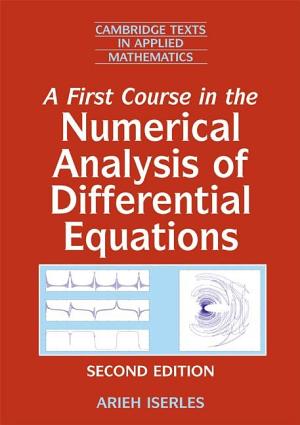Math 450
Numerical Methods for Differential Equations, Spring 2016
Basic Information
Instructor: Ari Stern
Email: astern@math.wustl.edu
Office: Cupples I, 211B
Office Hours: Tuesdays 2:30-4, Thursdays 11:30-1
Homework Assignments
Problem sets will be posted approximately biweekly, and will be collected at the beginning of class on the due date. You are encouraged to discuss the homework with your fellow students and to collaborate on problems, but your final write-up must be your own. Please make sure that your solutions are written clearly and legibly, and if your submission consists of multiple pages, please staple them together.
Jeff Zhang (jeffzhang@wustl.edu) is responsible for grading the homework assignments.
- HW1: handout [pdf], code [py]. Due Friday, January 29.
- HW2: handout [pdf], code [py]. Due Friday, February 12.
- HW3: handout [pdf], code [py]. Due Friday, March 4.
- HW4: handout [pdf], code [py]. Due Friday, April 1.
- HW5: handout [pdf]. Due Friday, April 15.
- HW6: handout [pdf], code [py]. Due Friday, April 29.
Lectures
Lectures will be held MWF 3-4pm, in Cupples I, 113. The first class will be on Wednesday, January 20, and the last will be on Friday, April 29. Class will be canceled for Spring Break (week of March 13-19).
Exams
The midterm exam will be held in class on Wednesday, March 9. The final exam is scheduled for Thursday, May 5, from 6-8pm, in Cupples I, 113 (our usual classroom).
Grading
Grades will be based on a weighted average of homework (40%, lowest score dropped), midterm exam (20%), and final exam (40%).

Textbook
The text for this course is A First Course in the Numerical Analysis of Differential Equations, by Arieh Iserles, published by Cambridge University Press.
Software
The programming component of this class is based on the Python programming language with the SciPy collection of numerical and scientific computing tools. This software is free and open source, and can be installed on your own computer.
Most students enrolled in the course will have previous experience with Python/SciPy from Math 449 last term. To students who did not take 449 last term, I recommend reviewing the programming assignments (and solutions), listed on the class web page, in order to get up to speed. You may also find it helpful to look at the the SciPy Getting Started guide.
The Anaconda Python Distribution is officially recommended for this course, and is available for Linux, Mac, and Windows.
Catalog Description
Application and analysis of numerical methods for ordinary and partial differential equations. Specific topics may include: Runge-Kutta methods, geometric numerical integrators, finite difference methods, finite element methods, spectral methods, etc. Prerequisites: Math 449 or permission of instructor.